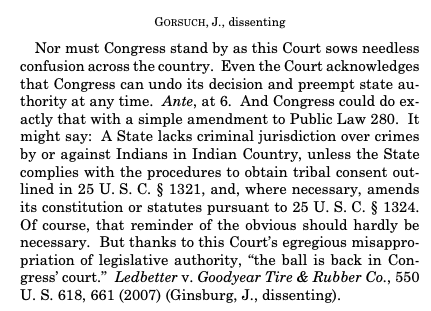
Professor @NYULaw; scholar of Congress, constitutional law, & federal Indian law; co-director, NYU-Yale American Indian Sovereignty Project; she/her/kwe.
2 subscribers
How to get URL link on X (Twitter) App


 5-4 divides on whether to read the statute as informed by a "self-determination principle" and whether the Congress or executive determines principles inherent in colonialism. Dissenters want decades of executive action to remain, even over Congress's wishes to the contrary. /2
5-4 divides on whether to read the statute as informed by a "self-determination principle" and whether the Congress or executive determines principles inherent in colonialism. Dissenters want decades of executive action to remain, even over Congress's wishes to the contrary. /2

 The framing generation never envisioned treaty or territory powers able to incorporate huge new swathes of land and peoples. Only those peoples in the map consented to and ratified the constitution. Want to stretch the US from sea to shining sea? Amend the Constitution. 2/
The framing generation never envisioned treaty or territory powers able to incorporate huge new swathes of land and peoples. Only those peoples in the map consented to and ratified the constitution. Want to stretch the US from sea to shining sea? Amend the Constitution. 2/


 that European colonization in the 1600s was never a predetermined success; that Native nations helped shape England’s crisis of empire; that the first shots of the American Revolution were prompted by Indian affairs in the interior;
that European colonization in the 1600s was never a predetermined success; that Native nations helped shape England’s crisis of empire; that the first shots of the American Revolution were prompted by Indian affairs in the interior;

 Native children have never been the province of the states. ICWA was simply a continuation of 200 years of federal policy over Native children. When the federal government tried to convince states to assume jurisdiction over Native children in the mid-20th c., states refused. 2/
Native children have never been the province of the states. ICWA was simply a continuation of 200 years of federal policy over Native children. When the federal government tried to convince states to assume jurisdiction over Native children in the mid-20th c., states refused. 2/

 Importantly, to objections based on the current partisan composition of the Congress: Indian law is not a simple partisan issue and it is hard to predict (just look at the dissent's author!). More, states won't want this unfunded mandate and many already rejected it.
Importantly, to objections based on the current partisan composition of the Congress: Indian law is not a simple partisan issue and it is hard to predict (just look at the dissent's author!). More, states won't want this unfunded mandate and many already rejected it.

 There is little to say here other than the fact that our Supreme Court has become a superlegislature. Precedent, statutes, separation of powers, reason, the rule of law, these things all mean nothing.
There is little to say here other than the fact that our Supreme Court has become a superlegislature. Precedent, statutes, separation of powers, reason, the rule of law, these things all mean nothing.
https://twitter.com/MaggieBlackhawk/status/1541412962245775360We can presume that Native people didn't intend these results, but why strip Native people of political agency? There is wonderful recent Native history offering these tactics as intentional (incl. by the Haudenosaunee): academic.oup.com/jah/article-ab…
https://twitter.com/mjs_DC/status/1498304849833861126It is a battle for the soul of American democracy. Are we a colonial power that subordinates and offers rights as, at best, mere paper tigers, and at, at worst, as tools to further the colonial project? Or will we finally do more to mitigate our constitutional failures?


